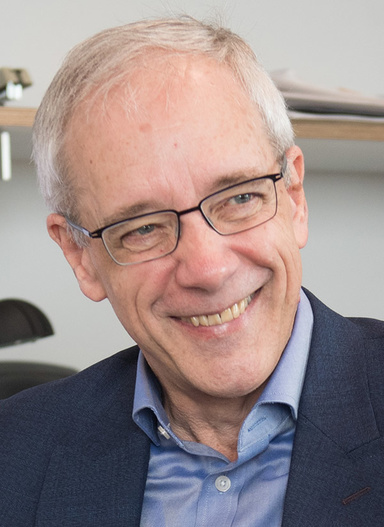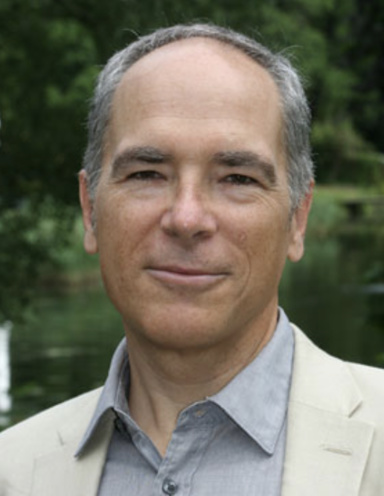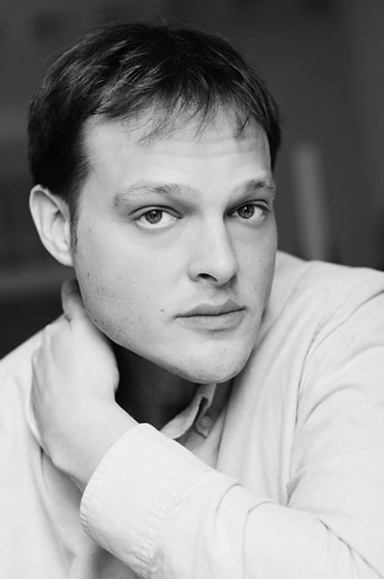Research in the arts and humanities has become more challenging than ever over the last decade as funding sources nationwide have dwindled. For the grants and fellowships that do remain, including for prestigious awards such as the Guggenheim Fellowship, competition is fiercer than ever.
Having two University of Iowa faculty members among the Guggenheim Foundation’s 175 recipients this year is a testament to the exceptional work being done by UI faculty, says longtime UI Professor of History H. Glenn Penny.
The Guggenheim Foundation this year received nearly 3,000 proposals for its prestigious Guggenheim Fellowships, an exclusive award bestowed on scholars, artists, and scientists who have demonstrated exceptional capacity for productive scholarship or exceptional creative ability in the arts.Penny and David Gompper, professor of composition in the UI School of Music, received awards this year.
“I’m grateful that fellowships like the Guggenheim still exist and allow us to do these things,” Penny says. “They get tons of excellent proposals, and there is a low acceptance rate. When you add the Guggenheim Fellowships with other prestigious grants from the NEH (National Endowment for the Humanities) and ACLS (American Council of Learned Societies) that faculty from the university get, it’s impressive.”
In all, 53 scholarly disciplines and artistic fields, 31 states and the District of Columbia, and two Canadian provinces are represented in this year’s class of fellows. Gompper is one of 11 composers chosen this year and the first in music composition at Iowa since 1967.
“The Guggenheim represents the work you have done, but also the promise of future compositions, and this time off will allow me to focus without having to shift gears,” Gompper says. “Being selected confirms that my many recent projects have paid off. This award is a step in the direction of being able to navigate or be recognized on an international level.”
The $50,000 grants will allow Gompper and Penny to take a full year off from teaching to focus solely on their research. For Gompper, that is writing a piano concerto, a triple concerto, and an orchestral piece called Starburst for Naxos Records, the world’s leading classical music label. Penny’s current project is titled Beyond Colonial Questions: Being German in Guatemala from the 1880s through the 1980s.
David Gompper: Architect of music
Gompper, a New York City native, learned to play piano at age 7, taking lessons from his grandmother who was a graduate of the Juilliard School. With his pianist grandmother and his grandfather who was a choir director and church organist in New York City, Gompper grew up trained in the classical repertoire, from Bach and Beethoven to Chopin and Messiaen.

“It helped that my family was there to guide me along, and to be raised with this type of sensibility and training at such a young age,” he says.
As a teenager, Gompper moved with his family to California, where he later received his bachelor’s degree in piano performance from San Diego State University. He was a composition and piano performance graduate of the Royal College of Music in London, England, and received a doctorate in music composition from the University of Michigan. Gompper taught at institutions including the University of Nigeria, Nsukka, and the University of Texas, Arlington, before coming to the UI in 1991.
“In his role as director of the UI Center for New Music, Professor Gompper has attracted artists and composers from all over the world to the UI campus and provided unique opportunities to perform 20th and 21st-century music to many School of Music graduate students,” says Christine Getz, associate dean for graduate education and outreach and engagement and professor of musicology at the UI. “David has been a teacher and mentor now for almost two generations of composers who have come through the program during his 30-plus years at Iowa. I am personally delighted to see him receive this well-deserved recognition.”
Gompper’s Guggenheim project follows three previous recordings on the Naxos and Albany labels: the 2019 releases of String Music and Double Concerto ‘Dialogue’/Clarinet Concerto/Sunburst, and Gompper: Violin Concerto, released in 2011. His previous CDs have been recorded in Henry Wood Hall and Cadogan Hall in London, where he was deeply involved in the recording process, a plan he hopes to follow for the new recording as well.
Composing music for a full orchestra is typically a nine-month process, which begins with Gompper jotting ideas down on paper and using the piano to “test things out,” he says.
“For many of my concerti, I cast them first as duets—violin and piano, double bass and piano—which allows me to make sure the composition works formally from beginning to end. Only then do I begin the process of orchestration,” he says. “Similar to an architect, my responsibility is to get the entire concept in place while at the same time being attentive to detail.”
H. Glenn Penny: Transnationalism and German migration to Latin America
During his first year studying engineering at the University of Colorado Boulder, Penny took a history class as part of a humanities requirement. A few semesters later, his advisor noted that the classes he was taking in history and political science were getting in the way of his engineering degree.

“I said, ‘Actually, I think my engineering degree is getting in the way of my studying history and political science,’” Penny says.
Penny’s future research interests were, in part, influenced by his childhood. His father was in the military and Penny was born in Germany. He received his master’s degree in Boulder and his PhD at the University of Illinois Urbana–Champaign. After doing a postdoc at Harvard and working at the University of Missouri–Kansas City, Penny joined the UI faculty in 2003.
“I was over the moon because although it’s a small university town, it’s a very cosmopolitan place,” Penny says. “And the history department at the University of Iowa was top notch and everyone knew it. They were all fantastic scholars and all involved in what today is called public history or public scholarship, but it was before we had the language for it. They were just doing it. That was incredibly inspiring.”
Over the years, Penny has become particularly interested in the large, interconnected German communities that flourished in Latin America.
“The history department is delighted to see Glenn’s work honored with this very prestigious and competitive award,” says Landon Storrs, professor and chair of the Department of History. “Glenn is known for his innovative work in transnational history. Although he is deeply grounded in German history, culture, and language, Glenn’s research illustrates how the flow of ideas, people, and culture across national boundaries have shaped not only German history but the human experience more broadly.”
The Guggenheim Fellowship will allow Penny to return to Guatemala to study documents from during and after WWII, when the Guatemalan government, under pressure from the U.S., seized ethnic Germans’ property and sent them to internment camps in the U.S.
“There is no way to do this research from afar,” Penny says. “The files are not digitized and there is no interlibrary loan. The only way to do it is to go there, sit there, and create working relationships with the archivists so they trust you to work with their materials. It’s been four years since I went there, and I’ve been trying to get back ever since. Without this fellowship, I would have had to give up hope and just write what I could with what I had. It’s rare to have this luxury and opportunity, and I’m so grateful.”
Integrating research into teaching—and vice versa
Due to the current COVID-19 pandemic, Gompper and Penny both decided to defer their fellowships until January 2021 when, hopefully, travel again will be allowed.
Meanwhile, the two faculty members say their research will impact their work in the classroom.
“It allows me to develop completely new courses,” Penny says. “One called Fleeing the Nazis: German Exiles in Latin America brought in a very diverse student group. It wasn’t just students interested in Europe, but students who wanted to know about migration and refugees and Latin America. So, I had lots of Latinos and Latinas, and students who were really interested in this part of the story. Because we were able to study documents that I had been using, students were getting insight into a part of history that is not in textbooks.”
For Gompper, composing his own work allows him to better prepare his students.
“I introduce them to the very latest compositions by modern, living composers, which in a sense is experimental because the work consists of notation they wouldn’t find in more traditional fare—Beethoven, for example,” he says. “This prepares them to function as professional musicians because they need to be able to understand and play anything placed in front of them, to navigate the specificity of a composer’s notation or intent.”
Gompper says the process also helps him continue refining his craft.
“The students think they’re the ones learning, but I’m constantly absorbing. In fact, I’m taking away more than they are,” he says. “They’ll question something that I thought I knew but I didn’t really understand deeply, which forces me to do a little more digging. I leave the building with a smile on my face thanks to the students.”
Visiting faculty member named Guggenheim fellow

Garth Greenwell, visiting assistant professor for spring 2020 in the Iowa Writers’ Workshop, was awarded a Guggenheim fellowship, the foundation announced April 8.
Greenwell is the author of What Belongs to You, which won the British Book Award for debut of the year, was longlisted for the National Book Award, and was a finalist for other prizes, including the PEN/Faulkner Award and the LA Times Book Prize.
His second book of fiction, Cleanness, was published in January 2020 and was an Indie Next selection and a New York Times Book Review Editors’ Choice.
University of Iowa recipients of the Guggenheim Fellowship since 2010 include:
2020
- David Gompper, School of Music, piano concerto, triple concerto, orchestral piece
- H. Glenn Penny, Department of History, Beyond Colonial Questions: Being German in Guatemala from the 1880s through the 1980s
2019
- Christopher Merrill, director, International Writing Program, The Trials of Roger Williams: A Biography
2016
- John D’Agata, Department of English, three essays
2013
- Phillip Round, Department of English, A Listening Ear: The Collaborative Practice of Early Native Literature
2012
- Judith Pascoe, Department of English, Wuthering Heights in Japan
- Steven Ungar, Cinematic Arts, Social Documentary in France, 1927–1962
2011
- Ethan Canin, Creative Writing, untitled collection of short stories
- Paula Michaels, Department of History, Lamaze: An International History
A complete list of 2020 fellows can be found on the foundation’s website at gf.org.